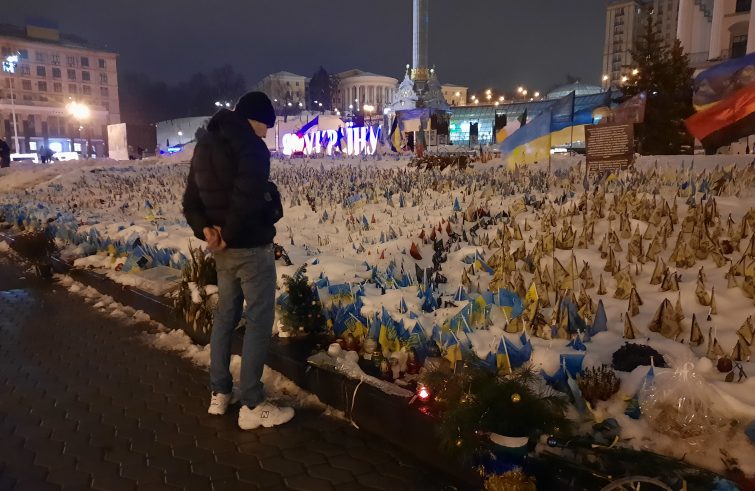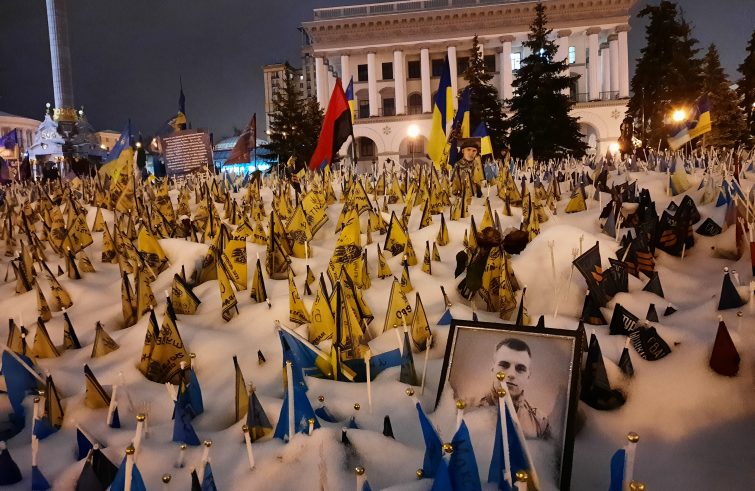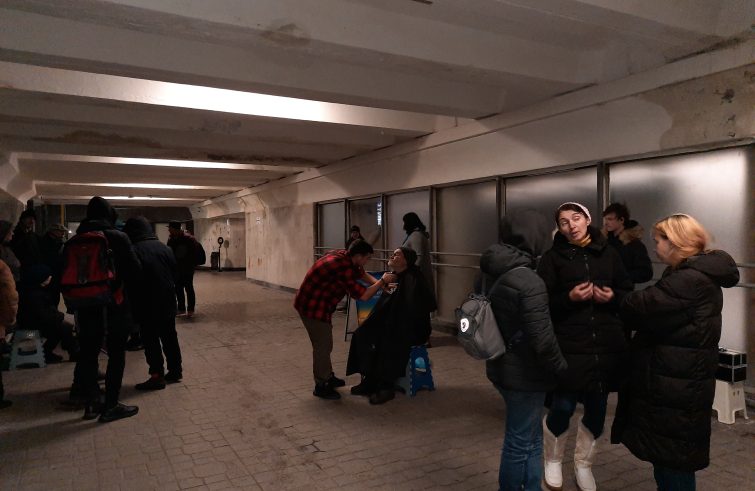
(from Kyiv) When the liturgy ends, not one person leaves the cathedral. The faithful, facing the altar, chant “Molytva za Ukrayinu”, the “Prayer for Ukraine”, a Ukrainian patriotic and spiritual hymn. It is sung with great solemnity. Virtually no sound can be heard. Everything is still. Here, in this chant and in these faces cracked by the winter cold and the scars of war, is encapsulated the entire spirit of Kyiv. We are gathered inside Kyiv’s Greek Catholic Cathedral of the Resurrection of Christ. Just a fortnight ago, on 25 November, the building was damaged in a massive Russian attack using unmanned drones. A ‘Shahed’ drone launched against the capital was shot down near the cathedral, but the shockwave damaged doors and shattered the windows.
It’s a melancholic Christmas. There is not a family in Kyiv that has not lost a loved one in the war, or that does not have a close relative fighting on the battlefield. Brothers, husbands, fathers.
After the liturgy, a tall young man in a green uniform approaches Bishop Bohdan Dzyurakh, who had just concelebrated the liturgy with His Beatitude Sviatoslav Shevchuk. Holding his hands tightly, the young man asks him to be blessed and to remember him in his prayers. He is leaving for the warfront.
Maidan Square, the symbolic place of the Ukrainian people’s desire for freedom. Here, from November 2013 to February 2014, thousands of young people fought for European principles and values. Today it is covered by a green meadow where a flag has been placed for every soldier who has fallen in combat since the outbreak of the large-scale war. The flags’ blue and yellow hues are marked with the soldiers’ names and dates of birth and death. Photographs of the dead soldiers are scattered across the lawn. They are all very young. A mantle of snow covers the ocean of flags,
hundreds of faces that are hard to distinguish in Kyiv’s dark nights, as is the case with the death toll of Ukrainians who fell on the battlefield. In fact, the government is keeping a tight lid on this information.
All that is known is that the number of flags is increasing relentlessly, day after day. The grief is immense and weighs heavily. Passers-by stop and gaze for a few moments at the frozen expanse. For some, it is the only way they can pay their respects to a loved one whose body was never brought home from the battlefield.
 Life in Kyiv goes on “as usual.” People can be seen walking along the streets of the city, taking the metro, on their way to work. But this normality is only apparent. The evenings are interrupted by curfews, including Saturday nights. It starts at midnight and ends at 5am. Unfortunately, the air raid sirens are a constant reminder of the threat. Just two days ago, Ukrainian anti-aircraft units foiled attacks on Kyiv carried out by the Russian armed forces. Explosions could be heard all over the city. The glass windows of the buildings were rattling. In addition to the military threat, extreme cold sent temperatures plummeting to below zero. People have difficulty walking on the icy streets. Despite it being almost Christmas, there are very few people in the shopping centres. Some shops even have their shutters down, a sign of the crisis that has also had an impact on the local economy. People are out of work, especially in the villages. There are no men, they are all at the front, and small businesses report difficulties in hiring workers.
Life in Kyiv goes on “as usual.” People can be seen walking along the streets of the city, taking the metro, on their way to work. But this normality is only apparent. The evenings are interrupted by curfews, including Saturday nights. It starts at midnight and ends at 5am. Unfortunately, the air raid sirens are a constant reminder of the threat. Just two days ago, Ukrainian anti-aircraft units foiled attacks on Kyiv carried out by the Russian armed forces. Explosions could be heard all over the city. The glass windows of the buildings were rattling. In addition to the military threat, extreme cold sent temperatures plummeting to below zero. People have difficulty walking on the icy streets. Despite it being almost Christmas, there are very few people in the shopping centres. Some shops even have their shutters down, a sign of the crisis that has also had an impact on the local economy. People are out of work, especially in the villages. There are no men, they are all at the front, and small businesses report difficulties in hiring workers.
 “There is a very sad atmosphere in Kyiv.” Msgr. Oleksandr Yazlovetskyi is auxiliary bishop of the Latin Catholic Church in Kyiv and president of Caritas-Spes. Many people have left and poverty has increased. Prices have risen because of the war. “People used to wonder when the war would end, but not anymore,” says the bishop. “We are getting used to the situation. But above all, there is no end in sight.” The bishop has a message: “It seems to us that people in Europe have forgotten us. We have been suffering from this war for two years. It’s to be expected that the attention of the media will decrease. But we ask you not to forget us and to keep us in your thoughts and prayers. Remember us especially in your prayers and in whatever help you can give us. Remember us because we are part of the European family and this war is also being fought in the heart of the European home.”
“There is a very sad atmosphere in Kyiv.” Msgr. Oleksandr Yazlovetskyi is auxiliary bishop of the Latin Catholic Church in Kyiv and president of Caritas-Spes. Many people have left and poverty has increased. Prices have risen because of the war. “People used to wonder when the war would end, but not anymore,” says the bishop. “We are getting used to the situation. But above all, there is no end in sight.” The bishop has a message: “It seems to us that people in Europe have forgotten us. We have been suffering from this war for two years. It’s to be expected that the attention of the media will decrease. But we ask you not to forget us and to keep us in your thoughts and prayers. Remember us especially in your prayers and in whatever help you can give us. Remember us because we are part of the European family and this war is also being fought in the heart of the European home.”









